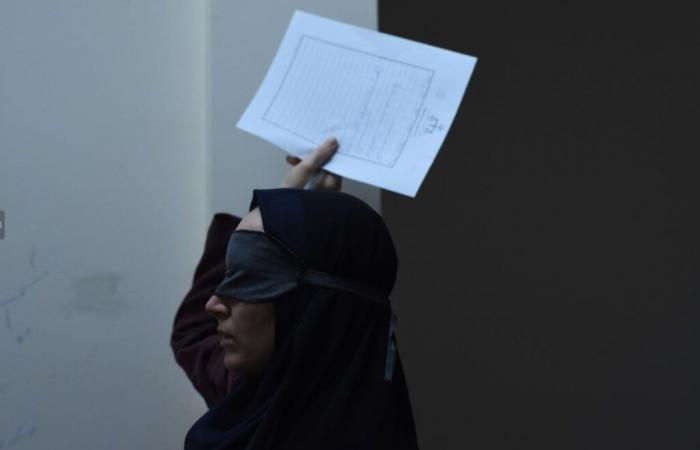First there is the foreshadowing of the breakup of a family, then the cracks widening within the oppressive Iranian regime. In this angry and superbly performed work by Mohammad Rasoulof, crowned with the Special Jury Prize at the last Cannes Film Festival, tension rises between a strict father, his daughters in search of freedom and their divided mother. In the background, demonstrators take over the streets of Tehran, demanding justice for Mahsa Amini.
Let us point out from the outset that The seeds of the wild fig tree is one of those films that you can’t write about without mentioning their production context. If it is in many respects an aesthetic tour de force, it is above all the palpable urgency of the political commentary of the director, now exiled in Germany, which grips us. This cannot be invented: Rasoulof, already imprisoned twice for his clandestine filming in recent years, finalized the editing of this film while he was fleeing Iran, a few days after being sentenced to eight years in prison for “collusion against national security”.
It was in prison that the 52-year-old filmmaker had the idea for this epic story, he told the media. Protesters arrested every day would have told him about the clashes that broke out at the height of the Woman, Life, Freedom movement. Then, upon his release, he became aware of the crucial role of images circulating on social networks in triggering the riots – images that he judiciously integrated into the film.
This relationship with the media is also reflected in the characters. Despite their daily lives a priori detached from the popular uprising, the teenagers Rezvan (Mahsa Rostami) and Sana (Setareh Maleki), confined to the cramped conditions of their austere apartment in the lower middle class of Tehran, gradually become interested in the testimonies of protesters. that they discover on their phone screens. Stories that systematically contrast with the propagandist news bulletins that their mother, Najmeh (Soheila Golestani), watches on television.
Psychological thriller
The first two thirds of the film plunge us into a sort of social drama. The father, Iman (Missagh Zareh), is also promoted to investigating judge at the revolutionary court in Tehran. Originally, this position comes with the promise of better days for the family: his salary increase should allow him to find more spacious accommodation. But new responsibilities lead him to sign sentences of demonstrators, sometimes to death, often without carrying out investigations. Without ever admitting it, the guilt consumes him.
A radical change in tone follows. The revolver that Iman kept at home disappears. Convinced that his daughters have hidden him, he falls into paranoia. The story then slides towards a psychological thriller, almost flirting with horror. On the one hand, the father believes he is threatened by militants seeking revenge; on the other, he feels Rezvan and Sana ever more sensitive to their cause. The camera gradually leaves behind the closed doors of the home to furtively follow the characters, tracking their every move, becoming more and more nervous. And Rasoulof excels at distilling dramatic tension.
-Certainly, the film as a whole seems less accomplished, on a formal level, than the director’s previous works. We think of The devil does not exist (2020), Golden Bear at the Berlinale, which already explored the figure of the executioner in Iran. But can we seriously blame him for this, when all the elements of Seeds of the wild fig tree reflect, as we have underlined, the urgency of his militant approach?
An approach that Mohammad Rasoulof also describes as “almost documentary”. He was indeed inspired not only by current events in his country, but also by individuals encountered during legal misadventures. This is perhaps why his nuanced writing, particularly of female characters, so accurately expresses the disillusionment of an adolescence marked by political violence, while testifying to a deep understanding of the power of social networks in current struggles. . An impact that finds its echo in cinema more than ever.
To watch on video
Belgium






